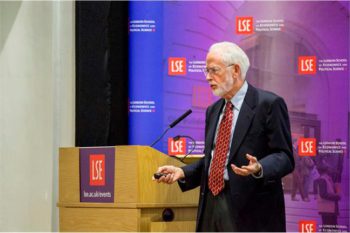Public lecture | Climate (and other) catastrophes
LSE Deparment of Government and Grantham Research Institute public lecture, introduced and chaired by Dr Kai Spiekermann
Attendance at this event is by registration only, if you would like to attend please register here.

Professor Robert S. Pindyck is the Bank of Tokyo‐Mitsubishi Professor of Economics and Finance in the Sloan School of Management at MIT. He is also a Research Associate of the National Bureau of Economic Research and a Fellow of the Econometric Society, and he has been a Visiting Professor at Tel‐Aviv University, Harvard University, and Columbia University. Professor Pindyck’s research and writing have covered topics in microeconomics and industrial organization, the behaviour of resource and commodity markets, financial markets, capital investment decisions, and econometric modelling. His recent work in economics and finance has examined the determinants of market structure and market power, the dynamics of commodity spot and futures markets, criteria for investing in risky projects, the economics of R&D and the value of patents, environmental policy, and the economic and policy implications of global catastrophic events.
Oversubscribe policy
Admission is on a first-come-first-served basis for those registered. Not everyone who registers attends, so, to ensure a full house, registration is oversubscribed. Please ensure you arrive at least 15 minutes before the start time to avoid disappointment.
Accessibility
If you are planning to attend this event and would like details on how to get here and what time to arrive, as well as on accessibility and special requirements, please refer to LSE Events FAQ. LSE aims to ensure that people have equal access to these public events, but please contact the events organiser as far as possible in advance if you have any access requirements so that arrangements, where possible, can be made. If the event is ticketed, please ensure you get in touch in advance of the ticket release date.
WIFI Access
LSE has now introduced wireless for guests and visitors in association with ‘The Cloud’, also in use at many other locations across the UK. If you are on campus visiting for the day or attending a conference or event, you can connect your device to wireless. See more information and create an account at Join the Cloud.
Visitors from other participating institutions are encouraged to use eduroam. If you are having trouble connecting to eduroam, please contact your home institution for assistance.
The Cloud is only intended for guest and visitor access to wifi. Existing LSE staff and students are encouraged to use eduroam instead.

